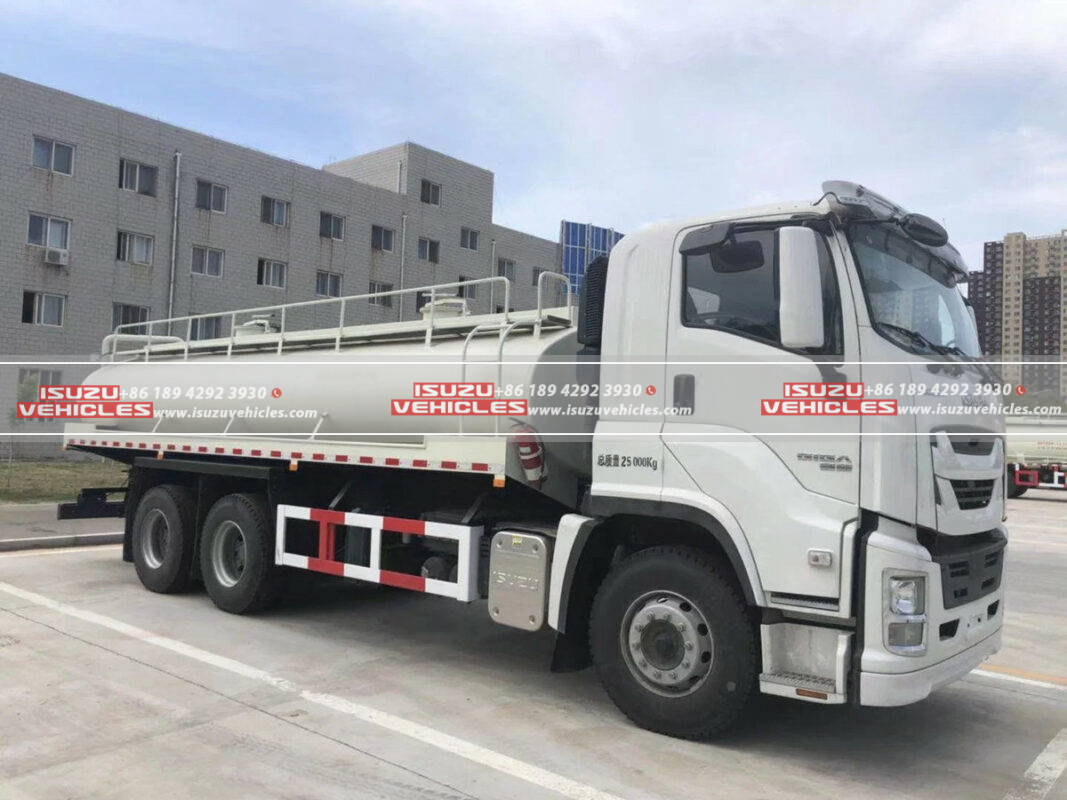In urban and industrial landscapes, water distribution is a cornerstone of public health, environmental sustainability, and operational efficiency. From dust suppression on construction sites to street cleaning and fire prevention, the precision and reliability of water delivery systems are non-negotiable. ISUZU sprinkler trucks stand at the forefront of this critical task, engineered to balance high-capacity water storage, precise spraying mechanisms, and rugged durability. This article explores how these vehicles optimize water usage, adapt to diverse applications, and integrate with broader municipal and industrial workflows, while addressing maintenance strategies and technological advancements that redefine their role in modern infrastructure.
The Multifaceted Role of ISUZU Sprinkler Trucks in Modern Communities
Water distribution is more than a logistical task—it’s a public service with far-reaching implications. ISUZU sprinkler trucks are designed to address challenges ranging from airborne dust mitigation to agricultural irrigation, ensuring resources are allocated efficiently and sustainably. Their versatility stems from customizable configurations, such as adjustable nozzle systems, variable pressure controls, and tank capacities tailored to project scales.
In construction zones, these trucks suppress dust to improve air quality and visibility, while in municipal settings, they clean streets, hydrate green spaces, or support firefighting efforts. The integration of ISUZU tanker trucks into fleets further enhances flexibility, allowing seamless transitions between transporting potable water, chemicals, or non-potable supplies. By prioritizing precision and adaptability, ISUZU sprinkler trucks help municipalities and contractors meet environmental regulations, reduce water waste, and maintain community well-being.
Engineering Insights: Design Features That Drive Efficiency
The effectiveness of a sprinkler truck hinges on its ability to store, pressurize, and dispense water reliably under varying conditions. ISUZU sprinkler trucks are built around a high-performance chassis, reinforced to support heavy water loads without compromising maneuverability. Their powertrains, often equipped with turbocharged diesel engines, deliver the torque needed to navigate steep gradients or operate in off-road environments, such as mining sites or rural farmlands.
Central to their functionality is the pressurized water system, which includes centrifugal pumps capable of generating consistent flow rates even at high altitudes. The trucks’ spray bars and nozzles are constructed from corrosion-resistant materials like stainless steel or polyurethane, ensuring longevity despite constant exposure to moisture and chemicals. Additionally, ISUZU’s ergonomic cab designs feature intuitive control panels, allowing operators to adjust spray patterns, pressure, and coverage areas without leaving the driver’s seat—a critical advantage in time-sensitive operations.
Maintenance Best Practices for Long-Term Reliability
Like all heavy-duty vehicles, ISUZU sprinkler trucks require meticulous care to sustain peak performance. Water systems, in particular, are vulnerable to sediment buildup, corrosion, and mechanical wear, making preventive maintenance essential for avoiding costly repairs or operational disruptions.
Daily Pre-Operation Checks: Ensuring Readiness
Before each shift, inspect the truck’s core components. Verify water tank levels and check for contaminants that could clog filters or nozzles. Examine hoses, couplings, and pump seals for leaks, which are common in high-pressure systems. Test the vehicle’s brakes, tires, and lighting systems to ensure roadworthiness, especially if transitioning between sites like construction zones and urban roads. For fleets that include ISUZU sweeper trucks, cross-check fluid levels and sweeping mechanisms to maintain synergy in municipal cleaning tasks.
Monthly Deep Maintenance: Preserving System Integrity
Every 30 days, conduct a comprehensive evaluation of the water distribution system. Drain and scrub the tank to remove algae or mineral deposits, which can affect water quality and pump efficiency. Lubricate the pump’s bearings and inspect the impeller for signs of erosion caused by abrasive particles. Replace worn nozzles and calibrate pressure gauges to ensure accurate readings. For regions with hard water, consider installing water softeners to reduce scale buildup in the system.
Operational Strategies for Maximizing Water Efficiency
Efficient water use isn’t just about conservation—it’s about achieving desired outcomes with minimal waste. Operators of ISUZU sprinkler trucks must balance pressure, coverage, and environmental factors to optimize every gallon.
Tailoring Spray Patterns to Application Needs
Adjust nozzle configurations based on the task at hand. For dust suppression, use fine mist settings to maximize airborne particle capture while minimizing runoff. For street cleaning, opt for higher-pressure jets to dislodge stubborn debris. In agricultural contexts, rotary nozzles can ensure even irrigation across uneven terrain. Utilize the truck’s onboard telematics, if available, to monitor water usage in real time and adjust flow rates dynamically.
Synergizing with ISUZU Sweeper Trucks for Urban Cleanliness
In municipal fleets, ISUZU sweeper trucks and sprinkler trucks often work in tandem. For example, pre-wetting roads before sweeping reduces dust emissions, while post-sweeping rinses ensure thorough debris removal. Coordinate schedules and routes to maximize resource efficiency, and share data between vehicles to identify areas requiring repeated attention.
Innovations Shaping the Future of Water Distribution
As technology advances, ISUZU is redefining sprinkler trucks with smarter, greener, and more connected systems. These innovations not only enhance performance but also align with global sustainability goals.
Smart Water Management Systems
Modern ISUZU sprinkler trucks are increasingly equipped with IoT-enabled sensors and GPS technology. These systems analyze soil moisture levels, weather forecasts, and traffic patterns to automate spraying schedules, reducing overuse in agricultural or landscaping applications. For instance, a truck operating in a smart city might receive real-time data to pause irrigation during rainfall, conserving thousands of gallons annually.
Electrification and Sustainable Practices
ISUZU’s commitment to sustainability is evident in hybrid and electric models designed for silent, emission-free operation—ideal for nighttime urban tasks. Additionally, water recycling systems allow trucks to collect and filter runoff for reuse, a feature particularly valuable in drought-prone regions. These advancements complement the eco-friendly designs of ISUZU tanker trucks, which increasingly incorporate lightweight materials and solar-powered auxiliary systems.
By embracing rigorous maintenance, operational precision, and cutting-edge technology, organizations can ensure their ISUZU sprinkler trucks remain indispensable tools in water management. These vehicles exemplify how innovation and reliability can coexist, delivering solutions that protect resources, enhance public spaces, and adapt to the ever-evolving demands of communities and industries alike.
